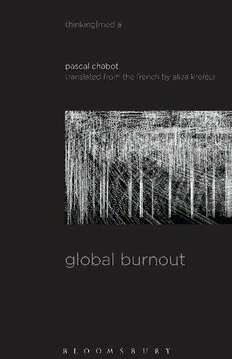
Global Burnout PDF
Preview Global Burnout
Global Burnout i Th inking|Media Series Editors: Bernd Herzogenrath Patricia Pisters ii Global Burnout Pascal Chabot Translated from the French by Aliza Krefetz Bloomsbury Academic An imprint of Bloomsbury Publishing Inc NEW YORK • LONDON • OXFORD • NEW DELHI • SYDNEY iii Bloomsbury Academic An imprint of Bloomsbury Publishing Inc 1385 Broadway 50 Bedford Square New York London NY 10018 WC 1B 3D P USA UK www.bloomsbury.com BLOOMSBURY and the Diana logo are trademarks of Bloomsbury Publishing Plc This translated edition published by Bloomsbury Academic 2018 First published in French by Presses Universitaires de France 2013 © Pascal Chabot and Presses Universitaires de France 2013, 2018 All rights reserved. No part of this publication may be reproduced or transmitted in any form or by any means, electronic or mechanical, including photocopying, recording, or any information storage or retrieval system, without prior permission in writing from the publishers. No responsibility for loss caused to any individual or organization acting on or refraining from action as a result of the material in this publication can be accepted by Bloomsbury or the author. Library of Congress Cataloging-i n-Publication Data A catalog record for this book is available from the Library of Congress ISBN : H B : 978-1-501-33438-2 e PDF : 978-1-501-33440-5 eBook: 978-1-501-33439-9 Cover design: Daniel Benneworth-Gray Cover image © Paolo Sanfi lippo Series: thinking|media Typeset by Refi neCatch Limited, Bungay, Suffolk To fi nd out more about our authors and books visit www.bloomsbury.com. Here you will fi nd extracts, author interviews, details of forthcoming events, and the option to sign up for our newsletters. iv To those who contemplate. “If your only tool is a hammer, every problem looks like a nail” Paul Watzlawick, C hange v vi Contents Foreword viii Introduction 1 Something is happening 1 Part I Beyond Fatigue 7 Freudenberger and the free clinic 7 Tired souls 12 In a Congolese leper colony 17 Part II Th e Burnout Machine 25 Abandoning perfection 25 Th e useful and the subtle 37 Recognition and disregard 47 Women’s burnout 56 Part III Postmodern Malaise 67 Th eory of a mirror disorder 67 Under the sign of fi re 75 Th e tightrope- walker’s manifesto 81 Part IV Postface to the English Edition 89 Burnout and energy 89 Th e invisibility of energy 94 Th e causes of repression 100 Dialectic of energy and desire 116 Post- burnout transition 121 Author’s Acknowledgments 125 Translator’s Acknowledgments 127 Bibliography 129 Index 133 vii Foreword Th e phenomenon we call burnout is not just a personal problem that aff ects a few exhausted individuals. It holds up a mirror to dysfunctions in the relationships between human beings and their material environment. Aft er analyzing the origins of the concept, the author identifi es three main types of burnout: the fi rst, specifi c to professions centered on caring for others, seems to stem from the exhaustion of their humanism; the second appears to be a problem of adaptation and perfectionism, while the third is a consequence of the struggle for recognition. Th e philosophical implications of each of these three conditions are identifi ed. Finally, burnout is presented as an occasion to rethink the pact between humanity and technology, and to reinterpret the notion of progress. viii Introduction Something is happening Something is happening. In the highway breakdown lane, a woman sits weeping in her car. It’s strange, the way her tears seem to pour out uncontrollably. Nothing can stop them. It is as if her entire body were emptying itself, as if it were expelling a humor that cannot be contained. Her hands tremble. She rocks back and forth. And the look in her eyes is one of incomprehension mixed with fear. Tears, they say, wash the emotions clean. But her tears aren’t washing anything away. Th ey are tears of destruction. A surge of suff ering is ravaging an otherwise stable person. It is as if her very existence has overwhelmed her. Th is body, this car, this life, everything, suddenly seems to her useless and insurmountable. We could understand this breakdown if it had happened in response to a death, a break- up, even a war. But there is no apparent cause for this implosion. Something else is happening; for example, that haggard man in his forties. For the last hour, he has been sitting motionless in front of his computer. Mouth open, eyes wild, he seems to be frozen in place. Earlier, he was double- checking some numbers on a spreadsheet. Th en everything went black, leaving a gaping void, a vacantness that bordered on madness. When he tried to get up, his body refused to obey him. From his pelvis to his shoulders, an inexplicable stiff ness paralyzed his spine. He had to be taken away in an ambulance, in front of his stupefi ed co- workers. For three months now, he has been confi ned to his bed, 1
